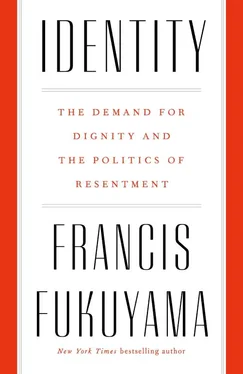These struggles for Hegel do not play themselves out primarily as individual journeys into the self, as they did for Rousseau, but politically. The great conflict of his day was the French Revolution, and its enshrining of the Rights of Man. The young Hegel witnessed Napoleon riding through his university town after the Battle of Jena in 1806 and saw in that act the incipient universalization of recognition in the form of the principles of the French Revolution. This is the sense in which Hegel believed that history had come to an end: it culminated in the idea of universal recognition; subsequent events would simply carry this principle to the far corners of the earth. {1} 1 Alexandre Kojève, Introduction à la lecture de Hegel (Paris: Éditions Gallimard, 1947).
A liberal democratic regime based on individual rights enshrines the notion of equal dignity in law by recognizing citizens as moral agents capable of sharing in their own self-government. In Hegel’s day, this principle was being imposed on countries by a general on horseback, but for the philosopher this was a small detail in the larger story of the growth of human freedom.
By the early nineteenth century, most of the elements of the modern concept of identity are present: the distinction between the inner and the outer selves, the valuation of the inner being above existing social arrangements, the understanding that the dignity of the inner self rests on its moral freedom, the view that all human beings share this moral freedom, and the demand that the free inner self be recognized. Hegel pointed to a fundamental truth about modern politics, that the great passions unleashed by events such as the French Revolution were at base struggles over dignity. The inner self was not just a matter of personal reflection; its freedom was to be embodied in rights and law. The democratic upsurge that would unfold in the two centuries after the French Revolution was driven by peoples demanding recognition of their political personhood, that they were moral agents capable of sharing in political power.
The slaves would, in other words, rebel against the masters; a world in which the dignity of only a few was recognized would be replaced by one whose founding principle would be recognition of the dignity of all.
The demand for the equal recognition of dignity animated the French Revolution, and it continues to the present day.
On December 17, 2010, police confiscated the produce from the vegetable cart of a Tunisian street vendor named Mohamed Bouazizi, ostensibly because he did not have a permit. According to his family, he was publicly slapped by a policewoman, Faida Hamdi, who confiscated his electronic scales as well and spat in his face. (That Hamdi was female may have increased his feeling of humiliation in a male-dominated culture.) Bouazizi went to the governor’s office to complain and to get his scales back, but the governor refused to see him. Bouazizi then doused himself in gasoline and set himself on fire, shouting, “How do you expect me to make a living?”
News of this incident spread like wildfire throughout the Arab world, triggering what became known as the Arab Spring. The immediate effect was felt in Tunisia, where less than a month later widespread rioting led to the resignation and departure of the country’s long-standing dictator, Zine El Abidine Ben Ali. Massive protests broke out in other Arab cities, most notably in nearby Egypt, where that country’s strongman, Hosni Mubarak, was driven from power in February 2011. Protests and uprisings took place in Libya, Yemen, Bahrain, and Syria, as populations felt empowered and were suddenly willing to criticize authoritarian leaders. What was shared among all of these protesters was resentment that they had been humiliated and disregarded by their governments.
In subsequent years, the Arab Spring went horribly wrong. The greatest tragedy occurred in Syria, where that country’s dictator, Bashar al-Assad, refused to leave power and launched a war against his own population that has to date killed more than 400,000 people and displaced millions more. In Egypt, early democratic elections brought the Muslim Brotherhood to power; fears that they would impose their brand of Islam on the country led the military to stage a coup in 2013. Libya and Yemen have descended into bloody civil wars, and authoritarian rulers tightened their grip throughout the region. Only Tunisia, where the Arab Spring originated, looks anything like a liberal democracy, but it is hanging on by a thread.
It is easy to look back on these events and argue that the Arab Spring from the beginning had nothing to do with democracy, and that the dominant political trend in the region is an intolerant form of Islamism. Yet this doesn’t do justice to the political passions that were unleashed by Mohamed Bouazizi’s self-immolation. The Arab world had been suffering under repressive and stagnant dictatorships for years; why all of a sudden did masses of people risk their lives in response to a single incident?
The particulars of Bouazizi’s story are critical. He was not a protester or a political prisoner mistreated by the regime, but an ordinary citizen who was struggling to make a living in the informal economy. Many entrepreneurs in the developing world remain informal because governments make it too difficult to comply with a host of legal requirements to run a formal business. What made Bouazizi’s experience all too familiar to millions of people in the Arab world was the way that he was treated by the Tunisian state: the goods on which his living depended were arbitrarily confiscated, he was publicly humiliated, and when he tried to complain and receive justice, no one would listen. The state was not treating him like a human being : that is, a moral agent worthy of a minimum amount of respect, who would at least have deserved an explanation or justification for why his livelihood had been seized. For millions of people in the Arab world, his self-immolation crystallized the sense of injustice they felt toward the regimes they were living under.
The Arab world subsequently fell into chaos because the Arabs themselves could not agree on what type of regime would replace the old dictatorships. Yet for a moment in 2011 they had a strong consensus on what they didn’t like: authoritarian governments that treated them at best as children, and at worst as subjects to be cheated by corrupt politicians, exploited economically, or used as cannon fodder in wars.
Over the past two generations, the world has seen a large number of spontaneous uprisings against authoritarian governments, from the protests that brought down Communist regimes in 1989, to the South African transition from apartheid, to other citizen mobilizations in sub-Saharan Africa in the 1990s, to the “color revolutions” in Georgia and Ukraine in the early 2000s in which recognition of basic human dignity was a central issue.
One of those uprisings, indeed, came to be known as the Revolution of Dignity. In November 2013 Ukrainian president Viktor Yanukovych announced that he was suspending his country’s attempt to finalize an association agreement with the European Union and would seek instead closer cooperation with Russia and Russian president Vladimir Putin’s Eurasian Economic Union. Yanukovych had been president at the time of the Orange Revolution in 2004; his effort to rig his reelection triggered a popular uprising that drove him from power. Yet by 2010 he had returned to the presidency as the corrupt and squabbling Orange Coalition that came to power failed to deliver on its promises.
Yanukovych’s effort to take Ukraine back into the Russian orbit triggered a series of spontaneous protests in the capital city, Kyiv, where by early December nearly 800,000 people had gathered in Maidan to support continued alignment with the EU. The regime responded with violence, but as in many situations of this sort, the killing of protesters simply fueled the level of outrage and increased the size of the crowds supporting the Euromaidan movement. Following the deaths of more than a hundred protesters in February, Yanukovych lost control of the situation and left the presidency for a second time, leading to a new political opening for Ukraine.
Читать дальше












